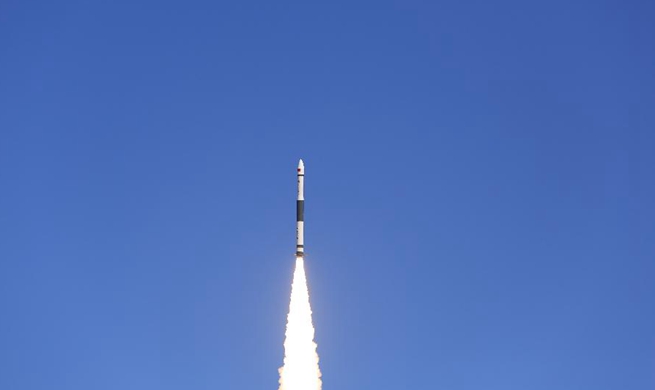GAZA, Sept. 29 (Xinhua) -- If Palestinian President Mahmoud Abbas takes anti-Hamas measures as implied by his speech at the UN General Assembly last week, it could lead to a full separation of the Gaza Strip and West Bank, experts said.
During his speech Thursday, Abbas said that either Hamas fully implements the agreements on reconciliation it signed with the Fatah movement, "or we will distance ourselves from any agreements or measures that are concluded without our approval and will not bear any responsibility."
Abbas also said that the next few days will witness the last rounds of dialogue with Hamas, "and then we will have another business."
This implied that Abbas will renege on the agreements with Hamas, which has been ruling the Gaza Strip since 2007, if the latter does not implement Palestinian reconciliation.
Experts said that any punitive measures or steps to be taken by Abbas against Hamas would mean the elimination of all opportunities for reconciliation between the two sides.
The Palestinian Authority (PA) may fully cut the salaries of its employees in the Gaza Strip, stop financing the ministries of education and health, and halt bank transfers, in addition to other retaliatory measures.
In response to Abbas' speech, Hamas criticized the Palestinian leader for using the UN platform to declare the separation of the Gaza Strip from the entire Palestinian territories, which is "a serious threat" to the future of reconciliation.
Hamas added that the threat is not consistent with the Egyptian efforts to restore Palestinian national unity, while holding the Palestinian leader responsible for any steps against Gaza.
Several agreements on Palestinian national reconciliation have been reached under the sponsorship of Saudi Arabia, Qatar and Egypt in the past years, but none of them has resulted in a tangible breakthrough to end the division that has begun since Hamas' takeover of the Gaza Strip in 2007.
Last October, Hamas and Fatah signed an Egyptian-sponsored reconciliation pact in Cairo to heal their prolonged rift.
Under the deal, Hamas should fully hand over its power in Gaza to the Ramallah-based consensus government in last December. But the differences between the two sides forced a delay in the implementation of the deal until further notice.
"President Abbas seems determined to go to a bitter divorce with Hamas, which means strangling it economically and financially," Abdel Nasser al-Najjar, a Ramallah-based Palestinian political expert, told Xinhua.
Al-Najjar pointed out that once this happens, an absolute chaotic situation will overwhelm Gaza, which will certainly push Hamas to use iron fist against any dangers or moves that might undermine its rule.
"Separation will be a heavy blow to the Palestinian cause as it will further suffer on the regional and international arenas, while it will give Israel another chance to complete its plan for settlement in the West Bank," he said.
But Al-Najjar believed that the separation cannot happen until all reconciliation attempts really fail.
An Egyptian intelligence delegation met with Abbas in Ramallah earlier this month as well as with the head of the Hamas political bureau Ismail Haniya in Gaza, in Cairo's latest effort to achieve a breakthrough.
Delegations of Palestinian factions, including Fatah and Hamas, visited Cairo recently and met with Egyptian officials to discuss ending the internal Palestinian division. However, no significant progress has been made.
"The reconciliation is stuck and it is difficult to make a serious breakthrough in light of both sides' lack of will to end the division," Mukhaimar Abu Saada, professor of political science at Al-Azhar University in Gaza, told Xinhua.
He added that the problem is that Abbas and his Fatah movement "view reconciliation from the perspective of hegemony, while Hamas views it from the perspective of preserving its rule and interests in Gaza."
"The future of reconciliation and the Gaza Strip may notably deteriorate if reconciliation talks fail," he noted. "Any punitive actions against Gaza could lead to its separation from the West Bank."
Abu Saada said if Abbas decided to punish Hamas, the Islamic movement would escalate Palestinian protests along the Gaza-Israel borders to pressure Israel, which could lead to a military confrontation. Then, Hamas might hope to ultimately reach understandings that could somehow relieve the hardship in Gaza.
Tension in the Gaza Strip has been high since the Palestinians launched the "Great March of Return" on March 30 to demand an end to the blockade Israel has imposed on the Palestinian enclave since 2007.
About 193 Palestinians have been killed and more than 20,000 others injured so far by Israeli forces in violent clashes along the Gaza-Israel borders.

















